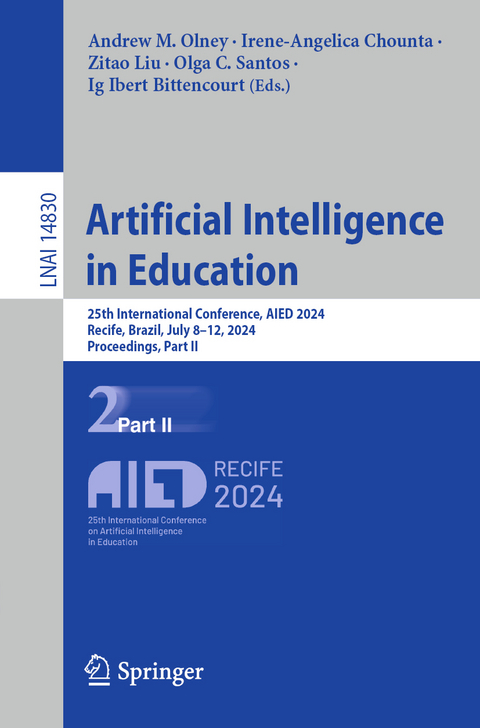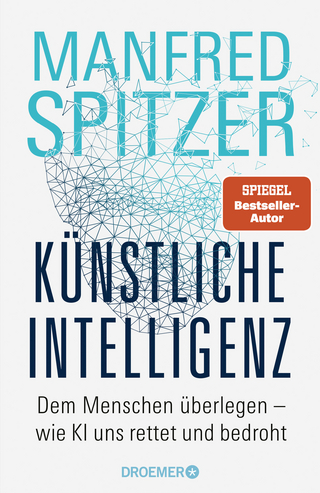
Artificial Intelligence in Education
Springer International Publishing (Verlag)
978-3-031-64298-2 (ISBN)
This book constitutes the refereed proceedings of the 25th International Conference on Artificial Intelligence in Education, AIED 2024, held in Recife, Brazil, in July 8-12, 2024, Proceedings.
The 49 full papers and 27 short papers presented in this book were carefully reviewed and selected from 334 submissions. The papers present result in high-quality research on intelligent systems and the cognitive sciences for the improvement and advancement of education.
.- A first step to using machine learning methods to enhance interaction analysis in embodied learning environments.
.- "I am confused! How to differentiate between. . . ?" Adaptive Followup Questions Facilitate Tutor Learning with Effective Time-on-task.
.- An Automatic Question Usability Evaluation Toolkit.
.- Evaluating Behaviors of General Purpose Language Models in a Pedagogical Context.
.- Federated Learning Analytics: Investigating the Privacy-Performance Trade-off in Machine Learning for Educational Analytics.
.- Towards the automated generation of readily applicable personalised feedback in education.
.- Identifying and Mitigating Algorithmic Bias in Student Emotional Analysis.
.- Navigating Self-Regulated Learning Dimensions: Exploring Interactions Across Modalities.
.- Real-World Deployment and Evaluation of Kwame for Science, An AI Teaching Assistant for Science Education in West Africa.
.- ChatGPT for Education Research: Exploring the Potential of Large Language Models for Qualitative Codebook Development.
.- Aligning Tutor Discourse Supporting Rigorous Thinking with Tutee Content Mastery for Predicting Math Achievement.
.- Automated Educational Question Generation at Different Bloom's Skill Levels using Large Language Models: Strategies and Evaluation.
.- VizChat: Enhancing Learning Analytics Dashboards with Contextualised Explanations using Multimodal Generative AI Chatbots.
.- Affect Behavior Prediction: Using Transformers and Timing Information to Make Early Predictions of Student Exercise Outcome.
.- To read or not to read: Predicting student engagement in interactive reading.
.- How Well Can You Articulate that Idea? Insights from Automated Formative Assessment.
.- Educational Content Personalization for Neurodiversity: A Survey of Technologies Supporting Linguistic Development in Individuals with Autism Spectrum Disorder (ASD).
.- Beyond the Obvious Multi-Choice Options: Introducing a Toolkit for Distractor Generation Enhanced with NLI Filtering.
.- Exploring the Potential of Automated and Personalized Feedback to Support Science Teacher Learning.
.- Coding With AI: How Are Tools Like ChatGPT Being Used By Students In Foundational Programming Courses.
.- Identifying Gaps In Students' Explanations of Code Using LLMs.
.- A Multi-Task Automated Assessment System for Essay Scoring.
.- Content Knowledge Identification with Multi-Agent Large Language Models (LLMs).
.- Using knowledge graphs to improve question difficulty estimation from text.
.- The Role of First Language in Automated Essay Grading for Second Language Writing.
.- An Educational Psychology Inspired Approach to Student Interest Detection in Valence-Arousal Space.
.- Agency in AI and Education Policy: European Resolution Three on Harnessing the Potential for AI in and Through Education.
.- Nudging Adolescents Towards Recommended Maths Exercises With Gameful Rewards.
.- A Learning Approach for Increasing AI Literacy Via XAI in Informal Settings.
.- Aspect-based Semantic Textual Similarity for Educational Test Items.
.- Adapting Emotional Support in Teams: Quality of Contribution, Emotional Stability and Conscientiousness.
.- Predicting successful programming submissions based on critical logic blocks.
.- Student At-Risk Identification and Classification through Multitask Learning: A Case Study on the Moroccan Education System.
.- Investigating the Predictive Potential of Large Language Models in Student Dropout Prediction.
.- Towards Automated Multiple Choice Question Generation and Evaluation: Aligning with Bloom's Taxonomy.
.- Enhancing student dialogue productivity with learning analytics and fuzzy rules.
.- HiTA: a RAG-based Educational Platform that Centers Educators in the Instructional Loop.
.- Towards Convergence: Characterizing Students' Design Moves in Computational Modeling through Log Data with Video and Cluster Analysis.
.- Mars, Minecraft, and AI: A Deep Learning Approach to Improve Learning by Building.
.- Characterising Learning in Informal Settings using Deep Learning with Network Data.
.- Exploring Teachers' Perception of Artificial Intelligence: The Socio-emotional Deficiency as Opportunities and Challenges in Human-AI Complementarity in K-12 Education.
.- Who Pilots the Copilots? Mapping a generative AI's Actor-Network to assess its educational impacts.
| Erscheinungsdatum | 02.07.2024 |
|---|---|
| Reihe/Serie | Lecture Notes in Artificial Intelligence | Lecture Notes in Computer Science |
| Zusatzinfo | XXXII, 461 p. 98 illus., 80 illus. in color. |
| Verlagsort | Cham |
| Sprache | englisch |
| Maße | 155 x 235 mm |
| Themenwelt | Informatik ► Theorie / Studium ► Künstliche Intelligenz / Robotik |
| Schlagworte | Collaborative Learning • computer-assisted instruction • Data Mining • E-Learning • Interactive Learning Environments • Knowledge Representation and Reasoning • machine learning • Natural Language Processing • Probabilistic Reasoning • Reinforcement Learning • Semantic networks • supervised learning • Unsupervised Learning |
| ISBN-10 | 3-031-64298-8 / 3031642988 |
| ISBN-13 | 978-3-031-64298-2 / 9783031642982 |
| Zustand | Neuware |
| Haben Sie eine Frage zum Produkt? |
aus dem Bereich


